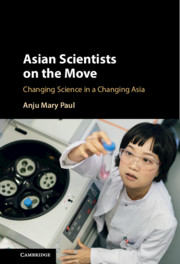Book contents
- Asian Scientists on the Move
- Asian Scientists on the Move
- Copyright page
- Dedication
- Contents
- Figures
- Tables
- Preface
- Acknowledgments
- Glossary
- Abbreviations
- Part I Contexts
- Part II Circulations
- 3 Leaving Home, Heading West
- 4 Learning Science in the West
- 5 Return to the Future or the Past?
- 6 Asian Women Scientists on the Move
- Part III Consequences
- Bibliography
- Index
5 - Return to the Future or the Past?
from Part II - Circulations
Published online by Cambridge University Press: 02 December 2021
- Asian Scientists on the Move
- Asian Scientists on the Move
- Copyright page
- Dedication
- Contents
- Figures
- Tables
- Preface
- Acknowledgments
- Glossary
- Abbreviations
- Part I Contexts
- Part II Circulations
- 3 Leaving Home, Heading West
- 4 Learning Science in the West
- 5 Return to the Future or the Past?
- 6 Asian Women Scientists on the Move
- Part III Consequences
- Bibliography
- Index
Summary
This chapter discusses the return decision-making process for Asian scientists trained in the West, to understand the factors driving the recent increase in return migrations. The factors which influence Asian scientists’ return decisions are organized along three axes of influence:
1. Integration, meaning the degree of social exclusion and cultural belonging Asian scientists experienced in the West, compared to what they imagined they would feel back in Asia
2. Familial obligation to their parents (often still in Asia) versus an obligation to their spouse and their children (in the West)
3. Ambition, which references their particular scientific and professional goals for themselves as individual scientists versus as citizens pursuing science for their country.
Keywords
Information
- Type
- Chapter
- Information
- Asian Scientists on the MoveChanging Science in a Changing Asia, pp. 147 - 182Publisher: Cambridge University PressPrint publication year: 2021
